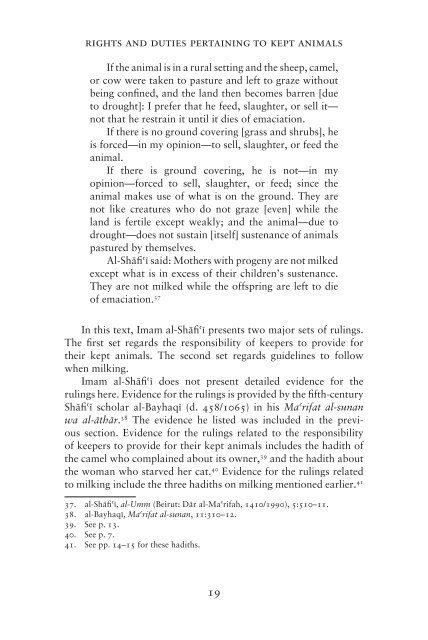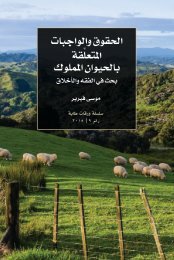Rights and Duties Pertaining to Kept Animals
1RcDQG8
1RcDQG8
You also want an ePaper? Increase the reach of your titles
YUMPU automatically turns print PDFs into web optimized ePapers that Google loves.
<strong>Rights</strong> <strong>and</strong> duties pertaining <strong>to</strong> kept animals<br />
If the animal is in a rural setting <strong>and</strong> the sheep, camel,<br />
or cow were taken <strong>to</strong> pasture <strong>and</strong> left <strong>to</strong> graze without<br />
being confined, <strong>and</strong> the l<strong>and</strong> then becomes barren [due<br />
<strong>to</strong> drought]: I prefer that he feed, slaughter, or sell it—<br />
not that he restrain it until it dies of emaciation.<br />
If there is no ground covering [grass <strong>and</strong> shrubs], he<br />
is forced—in my opinion—<strong>to</strong> sell, slaughter, or feed the<br />
animal.<br />
If there is ground covering, he is not—in my<br />
opinion—forced <strong>to</strong> sell, slaughter, or feed; since the<br />
animal makes use of what is on the ground. They are<br />
not like creatures who do not graze [even] while the<br />
l<strong>and</strong> is fertile except weakly; <strong>and</strong> the animal—due <strong>to</strong><br />
drought—does not sustain [itself] sustenance of animals<br />
pastured by themselves.<br />
Al-Shāfiʿī said: Mothers with progeny are not milked<br />
except what is in excess of their children’s sustenance.<br />
They are not milked while the offspring are left <strong>to</strong> die<br />
of emaciation. 37<br />
In this text, Imam al-Shāfiʿī presents two major sets of rulings.<br />
The first set regards the responsibility of keepers <strong>to</strong> provide for<br />
their kept animals. The second set regards guidelines <strong>to</strong> follow<br />
when milking.<br />
Imam al-Shāfiʿī does not present detailed evidence for the<br />
rulings here. Evidence for the rulings is provided by the fifth-century<br />
Shāfiʿī scholar al-Bayhaqī (d. 458/1065) in his Maʿrifat al-sunan<br />
wa al-āthār. 38 The evidence he listed was included in the previous<br />
section. Evidence for the rulings related <strong>to</strong> the responsibility<br />
of keepers <strong>to</strong> provide for their kept animals includes the hadith of<br />
the camel who complained about its owner, 39 <strong>and</strong> the hadith about<br />
the woman who starved her cat. 40 Evidence for the rulings related<br />
<strong>to</strong> milking include the three hadiths on milking mentioned earlier. 41<br />
37. al-Shāfiʿī, al-Umm (Beirut: Dār al-Maʿrifah, 1410/1990), 5:510–11.<br />
38. al-Bayhaqī, Maʿrifat al-sunan, 11:310–12.<br />
39. See p. 13.<br />
40. See p. 7.<br />
41. See pp. 14–15 for these hadiths.<br />
19



